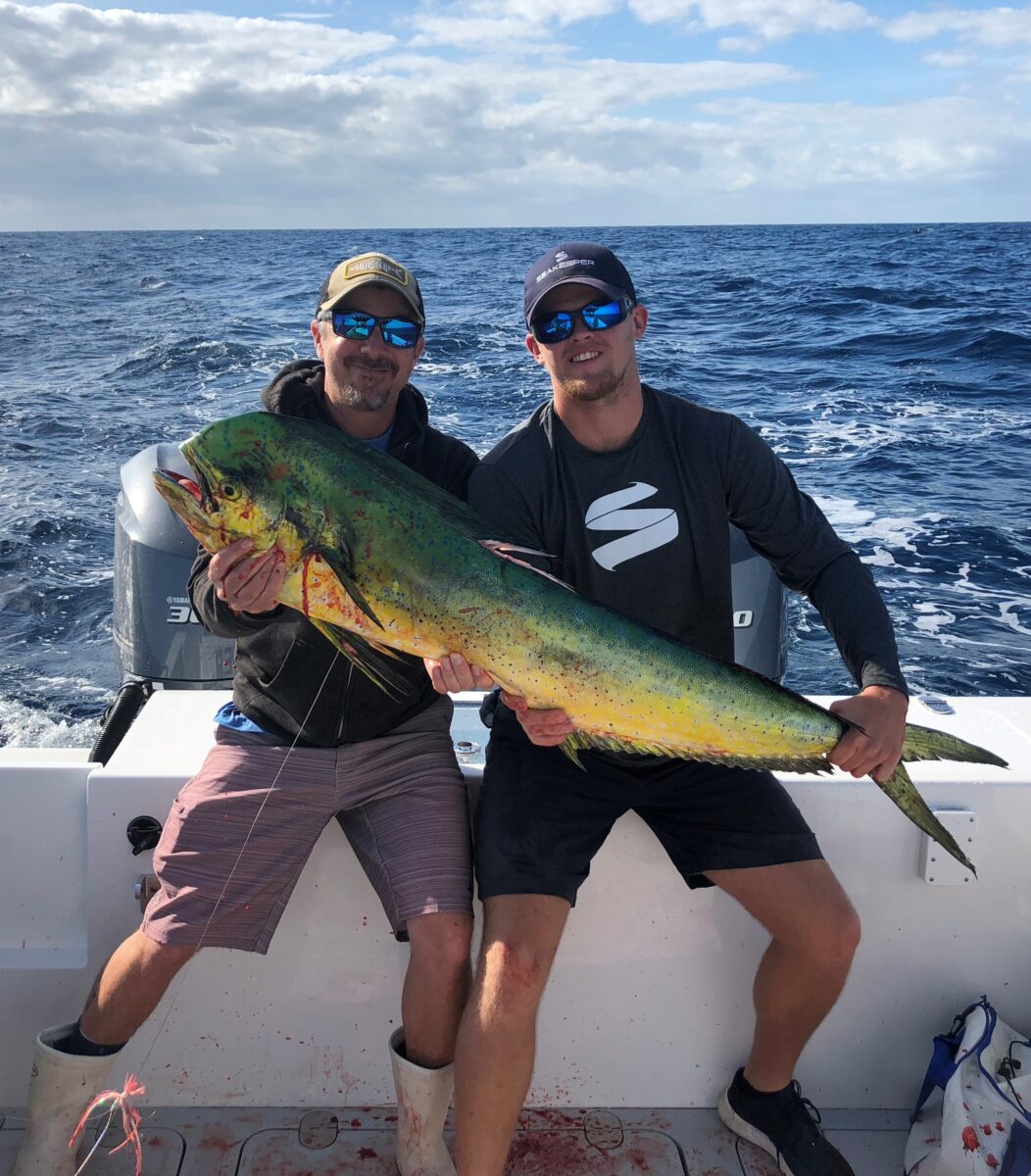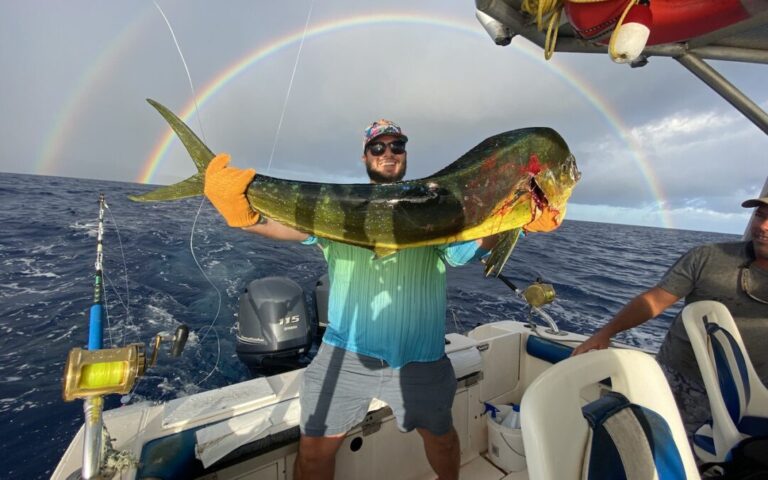To avoid seasickness on a deep sea fishing trip, take over-the-counter medications specifically designed for motion sickness prevention. Additionally, consider avoiding heavy meals and alcohol before and during the trip, as they can exacerbate nausea.
Opting for a cabin mid-ship where the boat has the least amount of movement can also help minimize seasickness.

Credit: www.seakeeper.com
Conceptualizing The Impact Of Motion Sickness At Sea
Motion sickness, also known as seasickness, can turn a dream deep sea fishing trip into a nightmare. The constant rocking and swaying of the boat can cause nausea, dizziness, and vomiting, leaving you feeling absolutely miserable. To avoid this unpleasant experience, it’s important to understand the causes of motion sickness on deep sea fishing trips and why it can make you more susceptible to seasickness.
Causes Of Motion Sickness On Deep Sea Fishing Trips:
- Inner ear confusion: When you’re on a boat, the movements of the vessel can disrupt the delicate balance in your inner ear, which is responsible for maintaining your sense of balance. This conflict between what your eyes see and what your inner ear senses can trigger the symptoms of motion sickness.
- Visual stimulation: In the open sea, there are fewer fixed visual references compared to being on land. The constant changing of the horizon, the movement of the waves, and the lack of stable surroundings can confuse your brain, leading to motion sickness.
- Sensory mismatch: The combination of the boat’s rocking motion, the sound of the waves crashing, and the smell of saltwater can create a sensory mismatch in your brain. This can overload your senses and trigger motion sickness.
- Anxiety and anticipation: The excitement and anticipation of a deep sea fishing trip can also contribute to motion sickness. Anxiety and stress can increase the likelihood of experiencing motion sickness symptoms. The fear of getting sick can often make it worse.
Why Deep Sea Fishing Can Lead To Increased Susceptibility To Seasickness:
- Greater movement of the boat: Deep sea fishing trips often involve traveling further away from the shore to find the best fishing spots. This means encountering larger swells and more intense rocking and rolling of the boat, which can increase the chances of developing motion sickness.
- Extended duration on the boat: Deep sea fishing trips can last for several hours or even an entire day. The longer you spend on the boat, the more time your body has to adapt to the constant motion, increasing the likelihood of experiencing motion sickness.
- Limited access to stable surfaces: Unlike standing on solid ground, deep sea fishing boats provide limited opportunities for finding stable surfaces. This lack of stable surfaces makes it difficult for your brain and body to find a reference point, contributing to motion sickness.
- Strong odors and smells: The combination of the sea air, bait, and fishy smells on a deep sea fishing trip can trigger nausea and exacerbate motion sickness symptoms.
By understanding the causes of motion sickness and the reasons why deep sea fishing can make you more susceptible, you can take proactive measures to prevent and manage seasickness. From choosing the right location on the boat to trying preventive measures like medication or natural remedies, you can enjoy your deep sea fishing adventure without the unwanted side effects.
Identifying The Symptoms Of Seasickness On A Fishing Adventure:
Nausea And Vomiting: Dealing With The Stomach-Related Effects
Experiencing seasickness on a deep-sea fishing trip can put a damper on your adventure. The symptoms of seasickness can range from mild discomfort to severe nausea and vomiting. Here are some key points to help you deal with the stomach-related effects:
- Stay hydrated: Drink plenty of water before and during the trip to keep your body hydrated and combat nausea.
- Eat light and before the trip: Avoid heavy, greasy, or spicy meals before setting sail as they can exacerbate the symptoms of seasickness.
- Choose the right spot on the boat: Position yourself in the middle of the boat where the motion is less intense, such as the center deck or the stern.
- Focus on the horizon: Keep your gaze fixed on a point on the horizon to help your brain adjust to the motion of the boat, which can reduce the feeling of nausea.
- Consider medication: Over-the-counter remedies such as motion sickness patches or medications can provide relief from nausea and vomiting. Consult with your doctor or pharmacist to find the best option for you.
Dizziness And Lightheadedness: Managing The Feeling Of Unsteady Motion
In addition to nausea, many people experience dizziness and lightheadedness when they are seasick. These symptoms can make it challenging to enjoy your deep-sea fishing trip. Here are some strategies to help you manage the feeling of unsteady motion:
- Maintain a stable position: Try to keep your body as still as possible and avoid sudden movements. Holding on to a stable structure on the boat can provide additional support.
- Find a focal point: Fix your gaze on a stationary object, such as the boat’s railing or a distant land formation. This can help reduce the sensation of dizziness.
- Practice deep breathing: Take slow, deep breaths to relax your body and alleviate any tension that may contribute to dizziness.
- Use acupressure bands: These specially designed wristbands apply pressure to specific points on your wrist, which can help alleviate symptoms of dizziness and lightheadedness.
- Take breaks and rest: If you start feeling dizzy, take short breaks to sit or lie down in a comfortable position. Resting can help your body adjust to the motion and alleviate the symptoms.
Cold Sweats And Headaches: Coping With Additional Discomfort
Seasickness can also manifest as cold sweats and headaches, adding to the overall discomfort. Here are some coping strategies to help you manage these additional symptoms:
- Dress in layers: Wearing layers of clothing allows you to adjust your body temperature as needed. This can help prevent excessive sweating or chills, which can worsen the discomfort.
- Stay in shaded areas: Avoid direct sunlight and seek shade on the boat as the heat can exacerbate headaches and discomfort.
- Stay well-hydrated: Proper hydration is essential to prevent headaches and reduce cold sweats. Drink water regularly throughout the trip.
- Apply a cool compress: Placing a cold towel or ice pack on your forehead or the back of your neck can help alleviate headache pain and provide a cooling sensation.
- Take breaks in fresh air: Stepping outside for fresh air can help relieve symptoms of nausea, sweating, and headache. If possible, stand near the stern of the boat, where the air is likely to be less turbulent.
Remember, everyone’s response to seasickness can vary, so it’s essential to find what works best for you. By implementing these strategies, you can increase your chances of enjoying a deep-sea fishing trip without the discomfort of seasickness.
Evaluating The Psychological Factors Contributing To Seasickness:
Deep sea fishing can be an exciting adventure, but for some people, the fear of getting seasick can dampen the experience. Seasickness is a common issue that occurs due to a combination of physical and psychological factors. While we can’t control the physical aspect completely, understanding and addressing the psychological factors can help minimize the chances of experiencing seasickness.
In this section, we will explore three key psychological factors that contribute to seasickness: anxiety and fear, anticipation and conditioning, and mindset and expectations.
Anxiety And Fear: Addressing The Role Of Stress And Apprehension
- Feeling anxious or fearful about the trip can increase the likelihood of experiencing seasickness. Here’s how to address these concerns:
- Practice relaxation techniques: Deep breathing, mindfulness, or meditation can help calm your mind and reduce anxiety.
- Seek professional help: If your fear is severe, consider consulting with a therapist who specializes in anxiety disorders to develop coping strategies.
- Stay positive: Maintaining a positive attitude and focusing on the fun aspects of your deep sea fishing trip can help alleviate anxiety.
Anticipation And Conditioning: The Effect Of Previous Negative Experiences
- Negative past experiences related to being on a boat or feeling seasick can create anticipatory anxiety. Consider the following to overcome these challenges:
- Rewire your associations: Engage in activities that create positive associations with boats and water, gradually desensitizing yourself to negative feelings.
- Gradual exposure: Start with shorter boat trips or choose a larger vessel for your deep sea fishing adventure to gradually acclimate your body and mind to the motion of the waves.
- Educate yourself: Learn about the physics of seasickness and reassure yourself that it is a common phenomenon that can be managed.
Mindset And Expectations: Overcoming Mental Barriers On The Journey
- Our mental state and expectations play a significant role in our susceptibility to seasickness. Consider the following tips to maintain a positive mindset:
- Stay hydrated: Dehydration can exacerbate the symptoms of seasickness, so it is essential to drink plenty of water before and during your fishing trip.
- Focus on the horizon: Keeping your gaze fixed on a fixed point on the horizon can help stabilize your inner ear and reduce the chances of feeling nauseous.
- Distract yourself: Engage in activities that divert your attention from the motion of the boat, such as chatting with fellow anglers, listening to music, or enjoying the scenery.
By understanding and addressing the psychological factors contributing to seasickness, you can increase your chances of having an enjoyable and nausea-free deep sea fishing trip. Remember to stay positive, manage anxiety, and gradually acclimate yourself to the boat’s motion, setting the stage for an exciting adventure on the open seas.
Selecting The Right Deep Sea Fishing Charter And Vessel:
Researching Reputable Fishing Charters: Ensuring A Safe And Comfortable Trip
When it comes to planning a deep sea fishing trip, selecting the right fishing charter and vessel is crucial. Here are some key points to consider:
- Do thorough research: Take the time to research different fishing charters in your desired location. Look for reviews and testimonials from previous customers to gauge their reputation and reliability.
- Check for necessary permits and licenses: Ensure that the charter holds all the required permits and licenses to operate legally. This will give you peace of mind and ensure a safe and compliant experience.
- Consider the experience and expertise of the crew: A reputable charter will have experienced captains and crew members who are knowledgeable about the area and the best fishing spots. This can greatly enhance your chances of having a successful and enjoyable trip.
- Look for safety measures: It’s important to prioritize safety when selecting a fishing charter. Check if they have the necessary safety equipment on board, such as life jackets, first aid kits, and communication devices. Additionally, inquire about their safety protocols in case of emergencies.
- Compare prices and services: While cost shouldn’t be the sole determining factor, it’s important to compare prices and services offered by different charters. Look for charters that offer a good balance of value for money and quality service.
Choosing A Vessel With Stabilizers Or Anti-Roll Systems: Minimizing The Impact Of Motion
The motion of the ocean can often lead to seasickness during a deep sea fishing trip. Here are a few points to consider when choosing a vessel:
- Stabilizers or anti-roll systems: Opt for a vessel that has stabilizers or anti-roll systems installed. These systems help minimize the rolling and pitching motion of the boat, reducing the likelihood of seasickness.
- Size of the vessel: In general, larger vessels tend to offer a more stable ride compared to smaller ones. Consider choosing a charter that provides larger boats for a smoother and more comfortable experience.
- Catamarans or multihull vessels: Catamarans and multihull vessels are known for their stability due to their wider base and dual hulls. If you have a history of seasickness or are prone to it, these types of vessels may be a good option for you.
- Discuss your concerns with the charter: Don’t hesitate to reach out to the fishing charter and discuss your concerns regarding seasickness. They may be able to provide additional recommendations or reassurances, ensuring a more comfortable trip for you.
Remember, selecting the right fishing charter and vessel is crucial for a safe, comfortable, and enjoyable deep sea fishing experience. Take the time to research and consider all the relevant factors to make the best choice for your trip. Happy fishing!
Packing Essential Items To Alleviate Seasickness:
Deep sea fishing trips can be an exciting and memorable experience, but for those prone to seasickness, it can quickly turn into a nightmare. Luckily, there are several packing essentials that can help alleviate seasickness and ensure you have a pleasant day on the water.
Here are the key items you should consider bringing with you:
Over-The-Counter Medications For Nausea And Dizziness: Finding The Right Option
When it comes to over-the-counter medications, there are several options available to help combat seasickness. Consider the following key points:
- Ginger supplements: Ginger has long been known for its ability to soothe nausea and is available in pill form. Taking ginger supplements before and during your fishing trip can help alleviate seasickness.
- Antihistamines: Medications like dimenhydrinate and meclizine are commonly used to treat motion sickness. These antihistamines work by blocking signals to the brain that trigger nausea. It’s important to note that these medications can cause drowsiness, so it’s best to try them out beforehand to determine your reaction.
- Transdermal patches: Scopolamine patches are another effective option for preventing seasickness. These patches are applied behind the ear and release a steady dose of medication over several days. They are convenient and provide long-lasting relief.
Natural Remedies And Alternative Therapies: Discovering Holistic Approaches
In addition to over-the-counter medications, there are also natural remedies and alternative therapies that can help alleviate seasickness. Consider the following key points:
- Acupressure wristbands: These wristbands apply pressure to specific points on the wrist believed to relieve nausea. They are easy to use and have no side effects, making them a popular choice among those seeking natural remedies.
- Peppermint essential oil: Peppermint oil has a soothing effect on the stomach and can help alleviate nausea. Applying a few drops to a handkerchief or wearing a scent diffuser necklace can provide relief throughout the day.
- Hypnosis and relaxation techniques: Some individuals find relief from seasickness through hypnosis or relaxation techniques. These approaches aim to calm the mind and body, reducing the symptoms of motion sickness.
Anti-Seasickness Devices And Accessories: Technology-Assisted Solutions
Advancements in technology have paved the way for various anti-seasickness devices and accessories. Consider the following key points:
- Sea-band: Sea-band is a wristband that utilizes acupressure to alleviate nausea. The bands are designed with a small plastic stud that applies pressure to the p6 acupressure point on the wrist.
- Reliefband: The reliefband is an fda-approved wearable device that uses gentle electrical pulses to stimulate the median nerve on the underside of the wrist. This stimulation helps to block the nausea signals sent to the brain.
- Virtual reality (vr) goggles: Some individuals find relief from seasickness by immersing themselves in a virtual reality experience. Vr goggles can help trick the brain into feeling as though you are on solid ground, reducing the likelihood of experiencing motion sickness.
By packing these essential items, you can greatly reduce the risk of seasickness and enjoy your deep sea fishing trip to the fullest. Whether you opt for over-the-counter medications, natural remedies, or technology-assisted solutions, finding what works best for you will ensure a smooth and enjoyable experience on the water.
Adopting Preemptive Measures Before Setting Sail:
Deep sea fishing trips can be an exciting adventure for any fishing enthusiast. However, the possibility of experiencing seasickness can put a damper on the whole experience. To ensure a smooth and enjoyable journey, taking preemptive measures before setting sail is essential.
Here are three key strategies to consider:
Eating Light And Avoiding Greasy Foods: Proper Nutrition For Minimizing Symptoms
- Opt for light, easily digestible meals before the trip, such as fruits, vegetables, and lean proteins.
- Stay away from greasy and heavy foods as they can exacerbate seasickness symptoms.
- Avoid consuming excessive amounts of alcohol or caffeine, as they can dehydrate the body and increase the risk of motion sickness.
- Snack on dry crackers or ginger candies during the trip. Ginger has natural anti-nausea properties that can help alleviate symptoms.
Staying Hydrated And Getting Enough Rest: Enhancing Overall Wellness On Board
- Drink plenty of water before and during the fishing trip to stay hydrated. Dehydration can worsen seasickness symptoms.
- Get a good night’s sleep before the journey to ensure your body is well-rested and better equipped to handle motion.
- Avoid excessive physical exertion or exhausting activities on the day of the trip. Resting and conserving energy can help minimize the risk of seasickness.
Acclimatizing To The Motion Of The Boat: Preparing The Body For The Journey
- Spend some time on the boat before setting sail to help your body adjust to the motion. Gradual exposure can reduce the likelihood of seasickness.
- Focus on the horizon or any stationary object while on board. This can help reduce the conflicting signals between your senses, easing the feeling of nausea.
- Consider using acupressure wristbands or patches that apply gentle pressure on specific points to alleviate seasickness symptoms.
- Consult with a healthcare professional about over-the-counter medications, such as antihistamines or ginger supplements, that can provide relief during the fishing trip.
By adopting these preemptive measures, you can increase your chances of enjoying a deep sea fishing trip without the discomfort of seasickness. Remember to listen to your body, stay hydrated, and take necessary precautions to make the most out of your fishing adventure.
Practicing Mindfulness And Relaxation Techniques:
Deep Breathing Exercises: Centering Yourself Amidst The Sea’S Motion
- Deep breathing exercises can help you find your center and maintain balance even amidst the motion of the sea.
- Take slow and deep breaths, inhaling through your nose and exhaling through your mouth.
- Focus on each breath as you inhale, feeling the air fill your lungs, and then exhale, releasing any tension or stress.
- Repeat this process several times, allowing yourself to become more mindful and present in the moment.
Progressive Muscle Relaxation: Easing Tension And Promoting Calmness
- Progressive muscle relaxation can help ease tension in your muscles and promote a sense of calmness.
- Start by tensing specific muscle groups in your body, such as your hands or shoulders, and then release the tension, allowing the muscles to relax.
- Move through different muscle groups, from head to toe, taking time to focus on each one.
- This technique helps you become more aware of your body, promoting relaxation and reducing motion sickness symptoms.
Meditation And Visualization: Focusing The Mind And Finding Inner Balance
- Meditation and visualization techniques can help you focus your mind, find inner balance, and reduce seasickness symptoms.
- Find a comfortable position, close your eyes, and bring your attention to your breath.
- Allow any thoughts or distractions to pass without judgment, returning your focus to the present moment.
- You can also visualize yourself in a calm and steady environment, such as a peaceful beach or a stable boat on still waters.
- Engaging in regular meditation and visualization practices can help train your mind to stay calm and grounded during a deep-sea fishing trip.
Remember, combining these mindfulness and relaxation techniques with other preventive measures like staying hydrated, avoiding heavy meals before the trip, and maintaining a horizon-level gaze can greatly reduce your chances of experiencing seasickness. So, take a deep breath, relax your muscles, and focus your mind on the present moment to enjoy your deep-sea fishing adventure to the fullest.
Engaging In Distraction And Diversion Techniques:
Engaging In Conversation With Fellow Anglers: Distracting From The Motion Sensation
When you find yourself on a deep sea fishing trip and the motion of the boat starts to make you feel queasy, engaging in distraction and diversion techniques can help alleviate the discomfort. One effective method is to strike up a conversation with your fellow anglers.
Not only does this take your mind off the motion sensation, but it also helps pass the time and create a sense of camaraderie. Here are some key points to keep in mind:
- Initiate conversations with other anglers about their fishing experiences, techniques, or favorite catch stories.
- Share your knowledge and ask questions to keep the conversation flowing.
- Discuss topics beyond fishing, such as hobbies, travel, or even local attractions.
- Encourage fellow anglers to share their tips and tricks for overcoming seasickness.
- Engaging in conversation not only provides a welcome distraction but also helps build relationships and create a supportive environment onboard.
Listening To Music Or Audio Books: Shifting Focus To Enjoyable Auditory Experiences
Another effective way to distract yourself from seasickness is by listening to music or audio books. By directing your attention to enjoyable auditory experiences, you can help alleviate the discomfort caused by the motion of the boat. Here are some tips to make the most out of this distraction technique:
- Create a playlist or choose audio books that you enjoy and find relaxing.
- Use headphones or earbuds to immerse yourself in the music or story, blocking out external stimuli.
- Opt for calming or uplifting genres that can help take your mind off the motion and improve your mood.
- If you’re into fishing-themed content, consider listening to podcasts or audio books about fishing adventures or tips.
- Remember to keep the volume at a moderate level so that you can still be aware of your surroundings and communicate with fellow anglers when needed.
Admiring The Marine Surroundings: Appreciating The Beauty Of The Ocean
One of the perks of being on a deep sea fishing trip is the opportunity to witness the beauty of the ocean firsthand. By focusing your attention on the marine surroundings, you can shift your mindset away from seasickness and instead appreciate the awe-inspiring sights.
Here are some suggestions on how to make this distraction technique work for you:
- Take breaks from fishing and spend a few moments observing the vastness of the ocean.
- Look out for marine wildlife such as dolphins, whales, or seabirds, and marvel at their grace.
- Observe the ever-changing hues of the water and the play of sunlight on the waves.
- Capture the mesmerizing views through photography or videos to create lasting memories.
- Remind yourself of the unique experience you are having and savor the opportunity to be out on the open sea.
Remember, engaging in distraction and diversion techniques can greatly contribute to reducing seasickness on a deep sea fishing trip. Whether it’s striking up conversations with fellow anglers, enjoying uplifting music or audio books, or simply admiring the marine surroundings, finding activities that divert your attention from the motion sensation can make your fishing adventure more enjoyable.
So, cast away your seasickness worries and relish the experience of being out on the open water!
Utilizing Physical Techniques To Manage Seasickness:
Fixing Gaze On A Stationary Object: Utilizing Visual Anchors To Reduce Dizziness
When it comes to managing seasickness on a deep sea fishing trip, one effective technique is to fix your gaze on a stationary object. This helps to stabilize your visual perception and reduce dizziness caused by the motion of the boat.
Here are some key points to keep in mind:
- Find a fixed point on the boat or the horizon and focus your eyes on it. This could be a pole, the edge of the boat, or a distant island. By concentrating on a stationary object, your brain can better adjust to the motion of the boat.
- Avoid looking at moving objects, such as other passengers or the waves. This can make the dizziness worse and increase the chances of experiencing seasickness.
- If possible, position yourself in a spot where you have a clear view of the horizon. This allows your eyes to have a reference point and helps with maintaining balance.
Finding The Optimal Location On The Boat: Minimizing The Impact Of Motion
To minimize the impact of motion and reduce the likelihood of getting seasick, it is important to find the optimal location on the boat. Here are some tips to consider:
- Position yourself in the center of the boat, where the motion is usually less pronounced. This area tends to be more stable and can help you avoid excessive swaying.
- Stay on the lower levels of the boat, as the movement is generally less intense closer to the water. Avoid being on the top deck or near the bow, as these areas tend to experience more motion.
- If possible, choose a seat or spot that allows you to face forward. This helps your body align with the direction of the boat’s movement, reducing the chances of feeling disoriented.
Trying Acupressure And Sea Bands: Stimulating Pressure Points For Relief
Another approach to managing seasickness is to try acupressure and sea bands, which can help stimulate certain pressure points to alleviate symptoms. Here’s what you need to know:
- Acupressure involves applying pressure to specific points on your body that are believed to relieve nausea and dizziness. The p6 or nei guan point, located on the inner side of your wrist, is commonly targeted for seasickness relief. You can use your thumb or a wristband specifically designed for acupressure to apply gentle pressure to this area.
- Sea bands, also known as acupressure wristbands, work on the same principle and apply continuous pressure to the p6 point using a small plastic stud. These bands are designed to be worn on both wrists and are generally an affordable and accessible option.
- It’s important to note that while acupressure and sea bands have worked for some individuals, their effectiveness varies from person to person. It’s worth giving them a try, but if you don’t experience relief, there are alternative methods to explore.
Remember that everyone’s experience with seasickness may differ, so it’s essential to try different techniques to find what works best for you. By utilizing physical techniques such as fixing gaze on a stationary object, finding the optimal location on the boat, and trying acupressure and sea bands, you can increase your chances of enjoying your deep sea fishing trip without the discomfort of seasickness.
Conclusion
Preventing seasickness on a deep sea fishing trip is essential to ensure an enjoyable and memorable experience. By taking simple measures such as choosing the right boat, staying well-hydrated, avoiding strong odors, and focusing on the horizon, you can effectively alleviate the symptoms of seasickness.
Additionally, incorporating natural remedies like ginger or acupressure bands can further aid in minimizing discomfort. It is also important to maintain a positive mindset and keep distractions at bay. Remember to listen to your body and take breaks when needed, as fatigue can worsen seasickness.
By following these tips, you can confidently embark on your deep sea fishing adventure and fully immerse yourself in the excitement and beauty of the open waters. Happy fishing!




